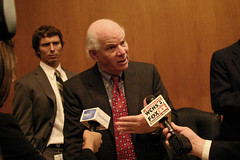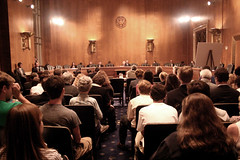
On Thursday, July 25, over seventy supporters of the Appalachia Restoration Act (S 696) lined up outside the door of Dirksen Senate Building for a hearing on the bill. The hearing, held by the Committee on Environment and Public Works’ Subcommittee on Water and Wildlife, was conducted by subcommittee chair Senator Ben Cardin, also a co-founder of the bill.
The Appalachian Restoration Act (S 696) is a Senate-sponsored bill to amend the Clean Water Act, outlawing the dumping of mining waste into streams. A 2002 change to the Clean Water Act by the Bush administration made it legal to dump mining waste into streams.
The bill would effectively eliminate the mountaintop removal coal mining practice of valley fills.
“Coal is important to America,” said Senator Cardin. “It is important to recognize the importance of energy needs in America. But we are talking about one type of coal mining here – mountaintop removal coal mining – and its impact on the water quality of America.”
“Saving our mountains is important to me, whether we are talking about cleaning up our streams, or ending the practice of blowing up mountaintops and dumping the waste into streams,” he said.

Two panels of witnesses provided testimony for the hearing, including EPA Region 3 Director Jon Pomponio, water quality expert Dr. Margaret Palmer from the University of Maryland, Paul Sloane, Deputy Commissioner of the Tennessee Department of Environment and Conservation, and Randy Huffman, Cabinet Secretary of the West Virginia Department of Environmental Protection.
During Dr. Palmer’s testimony, she indicated that there is “irrefutable evidence that impacts to streams from mountaintop removal [coal mining] is devastating. As headwaters are lost, cumulative effects in streams and rivers below are devastating.” When asked by the Senate panel how effective remedial programs would be to mitigate the damage, Palmer noted that there is no knowledge of an effective way to reverse the damage caused to streams, and that known impacts have been in continuance in some places for close to 50 years.
“When you take the top of a mountain off, you have fundamentally altered the hydrology of that mountain,” she said.
Paul Sloane, Deputy Commissioner of TDEC, claimed that “nearly 70% of post mining land uses is forestry reclamation.” Senator Cardin countered that he was told by a Virginia Tech professor that less than 1% of the currently 5800 valley fills in West Virginia and Kentucky had actually been reclaimed.

After the hearing, West Virginia Coal Association vice president Chris Hamilton spoke with media in attendance, saying that he was “disappointed in the way this was set up and organized. Those opposing [mountaintop mining] had four witnesses, and supporters [of coal] were virtually shut out of the process.”
“This bill [will impose] significant restrictions not only on mountaintop mining, but on surface and underground mining as well. I don’t think the answer is to abolish surface mining,” he added.
“The very concept of mountaintop removal is repugnant to me,” Senator Cardin said in an interview after the hearing. “This bill is about water quality. I’m not sure the mining companies are in the position to tell us about water quality.”
The next steps for the bill include the possibility of additional hearings in the subcommittee, followed by a vote. If the bill passes subcommittee, it will proceed to review by the full Environment and Public Works committee before passing to a full Senate vote.
To view an archived webcast of the entire hearing, visit the Senate website or click here to watch it now!





Leave a Reply